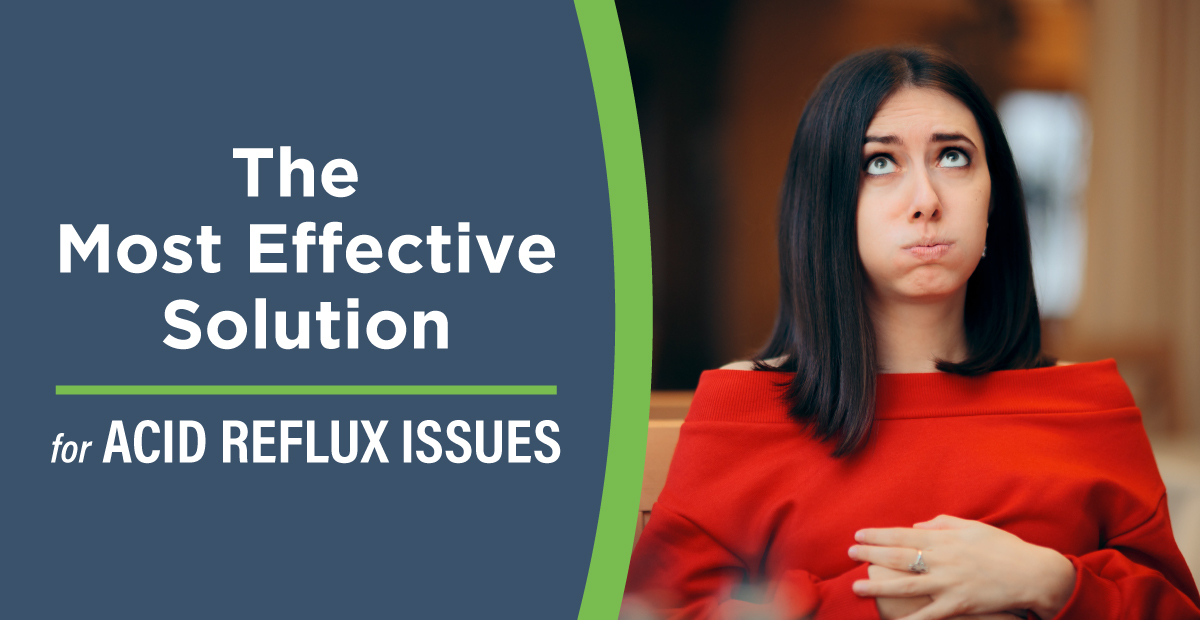
December 21, 2021
The Most Effective Solution for Your Acid Reflux Issues
Have you ever had heartburn at bedtime? Simply put: that painful, burning sensation that robs you of sleep can be awful. For some, the symptoms are mild and seem to go away on their own; but for many, a few sleepless, painful nights are just the beginning. If you’re having frequent heartburn, you may have acid reflux disease, also known as gastroesophageal reflux disease (GERD), when your condition is severe or chronic.
Acid reflux is caused by a weakness or relaxation of the lower esophageal sphincter. This is the valve that joins your esophagus and your stomach. Normally this valve shuts tightly after food enters your stomach. However, sometimes it relaxes when it shouldn’t, causing your stomach contents – stomach acid, food, etc. – to come back up into your esophagus.
Symptoms can be triggered a number of different things, including:
- Food choices – Most doctors agree that acidic, fatty and spicy food may contribute to your symptoms, and the size of your meals also makes a difference. Large meals are more likely to cause symptoms than small ones.
- Medicines – Aspirin, ibuprofen, sedatives and blood pressure medications may affect your condition.
- Alcohol and tobacco use – This relaxes the stomach valve, enabling food and stomach acid to rise up into your esophagus.
- Weight – Being overweight or obese increases the pressure on your abdomen or stomach, weakening the valve.
- Pregnancy – This also may increase pressure on your abdomen or stomach.
- Other diseases and conditions – One of the most common is a hiatal hernia, which according to the Cleveland Clinic, occurs when the upper part of the stomach abnormally pushes through an opening in the diaphragm and into the chest cavity. Typically, the opening in the diaphragm is where the esophagus and stomach join, and that valve closes tightly after letting in food. However, with a hiatal hernia, the valve is in a different place (inside the chest cavity), which may keep it from closing completely. Thus, letting in a back-flow of stomach contents that can be extremely painful and damaging to your esophagus.
Common symptoms of acid reflux and related conditions include:
- Heartburn
- A sour taste in your mouth
- Feeling overly full
- Coughing
- Hoarseness
- Feeling like you have food “stuck” in your throat
- Regurgitation
Symptoms may seem to intensify when you lay down or bend over because these positions may allow stomach acid to move more easily into your esophagus. Thankfully, there is hope. Certain medications, dietary changes and weight loss can help improve symptoms.
However, most patients report that these treatments help but do not completely “fix” the problem. If you’re still having symptoms, then acid reflux surgery might be the solution for you! For example, if you have a hiatal hernia, simply changing your diet isn’t going to fix the underlying medical condition that’s causing your symptoms, but surgery can. And after the surgery, you can go back to eating the foods you love, without the painful consequences!
You might be a good candidate for acid reflux surgery, if:
- You still have symptoms, despite dietary changes and medications.
- You continually require medications to control your symptoms and do not want lifelong medication use.
- You have a hiatal hernia or another underlying medical condition.
- You have frequent or ongoing symptoms that are affecting your quality of life.
Acid reflux surgery can be extremely beneficial, bringing you relief from acid reflux symptoms and preventing the serious complications that can occur if symptoms are left untreated. These complications include but are not limited to, esophagitis, ulcers, esophageal cancer and aspiration pneumonia.
There are two types of acid reflux surgery: linx surgery and nissen fundoplication, both of which are offered at Coryell Health. During linx surgery, the doctor wraps a ring of tiny beads around the lower esophageal sphincter, which keeps the opening closed, stopping reflux. During nissen fundoplication, the upper part of the stomach is wrapped around the lower esophageal sphincter, which also keeps the opening closed and prevents reflux.
Our acid reflux specialist, John Bawduniak, MD, can help determine which surgery is right for you. Board certified in general surgery, with significant training in vascular and endovascular surgery, Dr. Bawduniak has a special interest in complex, minimally invasive and laparoscopic surgery, as well as oncologic surgery and vascular surgery.
Operating in our Minimally Invasive Surgery Center, Dr. Bawduniak is specially trained in the use of Robotic-Assisted da Vinci®, which allows him to perform a wide range of delicate and complex operations through a few small incisions. Coryell Health’s da Vinci system enables Dr. Bawduniak to operate with enhanced vision, precision, dexterity and control.
Dr. Bawduniak is a gifted surgeon, who is highly skilled, highly trained and highly experienced. He’s one of the many reasons why you don’t have to drive to the “big city” to get state-of-the-art treatment. If you’re suffering from acid reflux symptoms, we can help. Call 254-865-8251 to book an appointment with Coryell Health today.
 Skip to content
Skip to content
